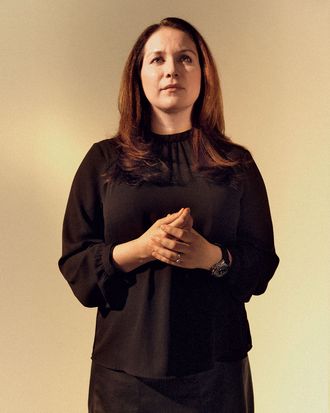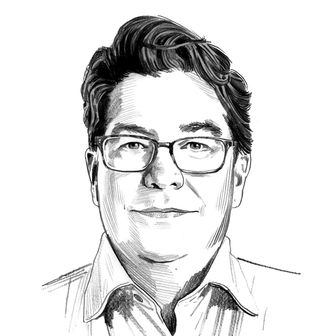
Around 7:30 p.m., three hours before she is scheduled to depart on an overnight flight to Jordan, Rukmini Callimachi sends me a text message. “I’m so sorry but I’m running really late,” it reads. Callimachi, one of journalism’s foremost experts on the grisly activities of ISIS and other extremist groups, is still at home, waiting for a last-minute load of laundry to dry. By the time she picks me up, on a corner outside her office at the New York Times Building, it is just two hours until takeoff. She is unperturbed, greeting me with a warm smile as I join her in the back seat of the Kia sedan. A backpack, stuffed to a rocklike density, is wedged between us. She’s rushing off on a monthlong reporting trip to the Middle East — her first since President Trump injected the region with even more chaos and mistrust.
The previous Friday, Trump had issued his executive order banning travelers from seven Muslim-majority nations, including the ISIS strongholds of Syria and Iraq. In the shocked aftermath, Callimachi, whose Twitter account is usually devoted to discussing national security and ISIS — and sometimes debating the group’s many online sympathizers — posted that she found herself “in tears at the news.” She says she thinks the order is “flawed from so many angles,” one of which is intensely personal for her. She was once a refugee.
As our Lyft driver, a bearded young man named Nejat, navigates through Times Square, Callimachi tells the story. In March 1979, when she was 5, Rukmini, her mother, and her grandmother boarded a train out of Romania. The communist regime of Nicolae Ceausescu tightly restricted travel, but her mother had managed to obtain passports by citing the need to visit an ill relative in Paris. “What she believes is that the authorities made the calculated decision that ‘Oh, two women and a child, that seems legit, they really are going to just go and come back,’ ” she says. “My dad basically sacrificed himself. He stayed back.” After a stressful passage through Hungary, where they were nearly detained by authorities, they ended up in Switzerland, where they were awarded asylum. The Romanian government punished her father, a skilled pediatric surgeon, by transferring him to a remote village.
“The five years of my life in Switzerland was a pretty dark time for us,” Callimachi says. “We suddenly had a label on us. We were refugees, and we were immigrants, and the worst of all was that we were from Romania.” In conservative Lausanne, she would hear the Swiss yell at her mother, cursing about ces putains de roumains — those “fucking Romanians.” But her disquieting immigrant experiences have since informed her reporting on jihadists, many of whom grew up in Europe, relegated to the fringes — as she was — by ethnic prejudice. “There’s something about their life where they’re at some level not fitting in,” she says. “And that seems very human to me.”
To Callimachi’s mind, the United States — she moved to California after her grandmother married an American — always seemed different from Europe: a place, she wrote on Twitter, “where *anyone* from anywhere can arrive and can belong/thrive.” She became a citizen and later a foreign correspondent, earning a finalist nomination for the Pulitzer Prize while reporting for the Associated Press in West Africa. She was living there when Barack Obama won the presidency in 2008, thrilling the continent. “The next day, when I walked to work, and we were walking past the vegetable sellers and the taxi vendors, everybody was doing that ‘L’américaine!’ and thumbs-up,” she says. She recalls being summoned to a press conference by the newly reelected president of Senegal, who delivered an hours-long harangue against the press for suggesting he might lose. “I remember sitting there as a young American reporter, seeing this spectacle and thinking, This would never happen at home.”
The events of the past year, though, have shaken such assumptions of superiority. The night after Trump signed the travel ban, Callimachi went to the home of a friend who was hosting a dinner for a Syrian refugee couple. The husband, trained as a chef back home, had prepared a Middle Eastern banquet. The Arabic speakers at the party tried to explain to the perplexed refugees what was happening at airports all around the country, where people like them were being detained and outraged protesters were rallying. But no one could quite believe the news. “I’ve gotten emails and messages from dismayed friends who are trying to get some clarity on what this means, and of course I don’t have clarity myself. I don’t understand where this is going to lead,” Callimachi says.
Though she often travels into the field, Callimachi is best known for her investigations into the ways ISIS recruits fighters and spreads propaganda via online social networks. It used to be that would-be terrorists traveled to remote camps to be trained to carry out acts of violence, but today, a jihadist never has to leave his computer. That is why Callimachi, like many terrorism experts, thinks the travel ban is likely only to aid the extremist cause. Although ISIS has yet to release an official statement, the militants she monitors were celebrating on Twitter and in their Telegram channels. Some were happy that Trump appeared to be tearing down American democracy from within. “The other line of commentary,” Callimachi says, “is that this just shows the great evil of America for what it really is. This is what they knew America always was, and now the mask has been taken off.” To those who long for an apocalyptic war between Islam and the secular West, Trump’s confrontational moves look like the fulfillment of a prophecy.
The Kia swings up a concrete ramp and stops in front of the terminal, and I help Callimachi wheel a pair of large suitcases to the counter for Royal Jordanian Airlines. Women in head scarves are clustered around the elastic entrance to the check-in line. Families are hugging, saying good-bye.
“When you look at President Trump’s tweet where he says that we didn’t tell anybody because otherwise the bad guys would come in,” she says. “Who are these ‘bad guys’?” The vast majority of people who have been arrested in America for ties to ISIS have been citizens or permanent residents; since 2001, there have been few cases of terrorist attacks mounted by foreign visitors. “Omar Mateen: born here. San Bernardino, half of the couple was born here, the other was from Pakistan — a place that’s not on the list,” she says. “The point is to keep us safe, but the people who are doing this are overwhelmingly not from these countries. And at the same time we are aggravating our relationship with the very partners that we need.” Callimachi is a reporter, but she knows that once she lands in the Middle East, she will be the one facing questions. “You know, when you’re an American living overseas, your country’s foreign policy is basically tattooed to your forehead,” she says.
In December, shortly after Trump’s election, Callimachi visited the city of Mosul, where the Iraqi army is engaged in a bloody street-by-street battle to drive out ISIS. “Iraqi troops are dying in large numbers,” she says. And now the United States, their supposed ally, has labeled these allies personae non gratae. “I’ve been with Iraqi troops and with the Peshmerga and have seen how they are fighting for Mosul and the price that they’re paying,” she says. “It’s got to be pretty insulting to have a place on this list.”
Now Callimachi is returning to witness the consequences. Her flight is boarding, and she gets in the security line, American passport in hand.
*This article appears in the February 6, 2017, issue of New York Magazine.






























